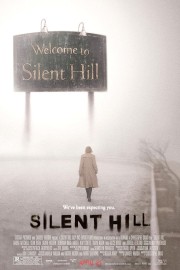Silent Hill
I don’t usually get hyped up about adaptations of video games (I avoided “Doom” like a plague, and “Resident Evil” just didn’t do anything for me), but from the trailer there seemed to be something deeper to this one. That might have to do with who was involved in it though. The film starred Radha Mitchell (who gave the best female performance on 2005 in Woody Allen’s “Melinda and Melinda”) and Sean Bean (one of Hollywood’s best character actors after “The Lord of the Rings” and “North Country,” among others). The writer is Roger Avary, who won an Oscar for co-writing “Pulp Fiction,” which makes up for the disdain I felt for his 2002 writing-directing effort “Rules of Attraction.” The director is Christophe Gans, who made a splash with the geeks back in 2001 with “Brotherhood of the Wolf,” a French period horror film with a hint of “Matrix” martial arts thrown in for good measure. Personally, “Wolf” wasn’t the end-all several geeks made it out to be, but it was a fascinating hybrid of genres by Gans, whose distinct vision got me intrigued even more to see “Silent Hill” when I found out he was the director.
That vision is evident throughout “Silent Hill.” Based on a series of four video games, it’s a credit to Avary and Gans that I can’t possibly make out the type of video game this is. I have to think it’s a first-person shooter along the lines of most of the better games out there now, but the story this writer and director have to tell seems too deep to lend itself to such a handling as a game. It’s like “Resident Evil” by way of “Myst” in its storytelling, if that makes any sense to the gamers out there. By the way, I’m not a gamer myself if you didn’t already figure that out; I indulge some, but not often.
Mitchell and Bean star as Rose and Christopher De Silva, a husband and wife whose adopted daughter Sharon (Jodelle Ferland) sleepwalks, and during this time risks killing herself and talks of a place called Silent Hill. Determined to help Sharon in any way possible, Rose drives her up to Silent Hill, which is now a ghost town after a series of fires started 30 years before left the town uninhabitable, killing most of its citizens, though some survived. Fires are still bellowing underground, shrouding the town in a neverending ash rainfall. But there’s something not right with the town beyond that, as Rose- who has lost Sharon in the town- and Cybil Bennett (Laurie Holden), an officer who followed Rose into the town after she grows suspicious of the worried mother, find out quickly. When darkness comes, the dark sins of the town’s past manifest themselves in the form of demons, and only the church in the middle of the town is safe haven for true believers. To find Sharon, Rose must follow clues leading her to the truth of why Silent Hill was destroyed, and though Christopher is determined to find his wife and daughter after he discovers Rose’s plan, Silent Hill’s otherworldly effects prevent him from finding them.
The ending of the movie gives me the most pause. I think I get it well enough, but the reasons for it felt more under-explained than teasingly ambiguous. That said, what a bold ending to a modern American horror movie. Leading up to the conclusion I was waiting for that gratuitous “last shock” that seems evident in most contemporary horror films, even the best ones. Well, I got it, but instead of being a jump out of your seat scare, it was a sinuous and chilling sucker punch in the gut more akin to “The Shining” than “Friday the 13th.” It actually reminded me of when I read the novelization of David S. Goyer’s screenplay for “The Crow: City of Angels” back when that film came out. That film was compromised by two different visions, one which wanted to simply rehash the original beat for beat (that would be the one that won out), the other which wanted to go for a deeper resonance by turning the story on its head, and daring for a more poignant conclusion that befitted the story more than convention would (that would be the ending I discovered in the novelization, and lamented its changing for the film). The latter is similar to how “Silent Hill” closes in Gans and Avary’s hands, and the effect is jolting. “Silent Hill” is carried forward by haunting visuals (I have to get this movie on DVD just to experience the look of this film again), and an intelligence and daring of storytelling more befitting the work of David Cronenberg or the Japanese horror filmmakers behind “Ringu” and “Ju-on.” It’s one of the best horror movies in recent memory to come from a purely American source. Note to Hollywood- make more films like this.










